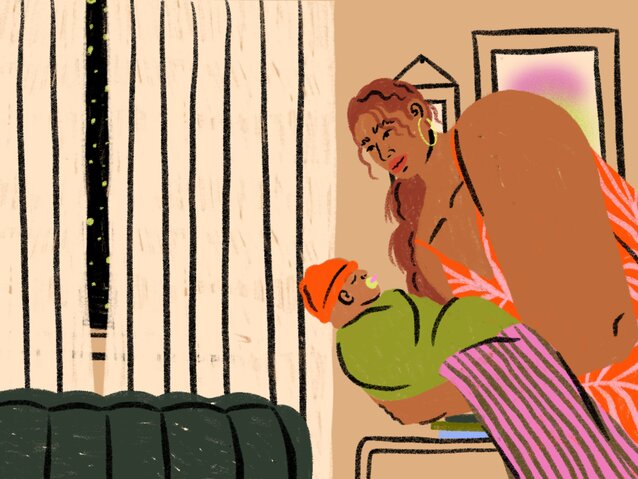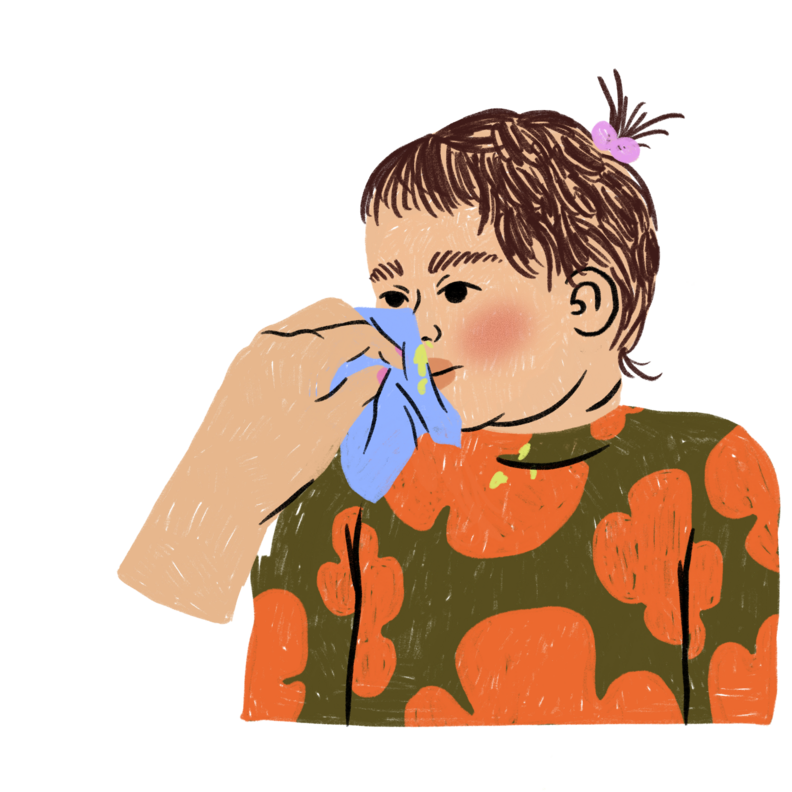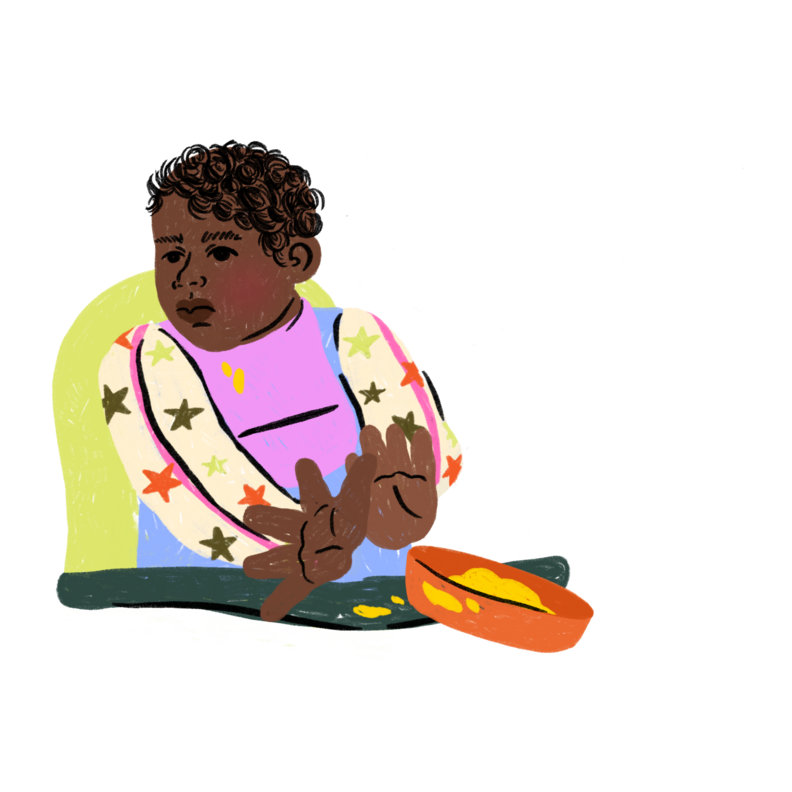

Is It Just a Cold? These Symptoms Could Be Warning Signs of RSV in Babies
Published on 12/17/2024 at 12:05 PM
Most of the time, parents don't worry too much about a run-of-the-mill cold. Of course, it's another story when your child starts coughing or spikes a fever — symptoms that can be especially concerning for babies under 1 year of age whose immune systems are still developing.
As board-certified obstetrician-gynecologist and mother of two Jessica Geida, DO, explains, many cold symptoms could also be signs of respiratory syncytial virus (RSV), an illness that's especially common in babies less than 1 year of age. Though most people who contract RSV have cold-like symptoms, Dr. Geida explains that RSV is the leading cause of hospitalization in babies less than 1 year of age, and 2 out of 3 babies will get RSV by their first birthday.
Premature babies, babies with congenital heart or lung diseases, and babies with weakened immune systems are at an especially high risk for complications, but all babies are at risk from RSV, according to Dr. Geida.
Some babies who get RSV will develop a more severe infection and require hospitalization. "When it affects the lower respiratory tract, it can cause bronchiolitis and/or pneumonia, or inflammation of the small airways of the lungs and/or infection in the lungs, respectively," Geida says. "At times the infection may be so severe as to cause apnea [or dangerous pauses in breathing] and/or respiratory failure, requiring respiratory support with supplemental oxygen and, rarely, intubation."
The best thing parents can do is keep a close eye out for any signs of this illness. Spotting the symptoms as soon as possible can help your child get the care they need. Dr. Geida explains that parents should monitor their children closely for symptoms of severe RSV like dehydration or difficulty breathing, as these are some things that will require an evaluation by a healthcare provider. Watch for the following symptoms in particular, and if you're concerned about RSV, talk to your baby's doctor about potential ways to help protect your family.

Fever
Although fevers are not uncommon with a cold, if your baby is younger than three months with a fever of 100.4° F or higher, or is older than three months with a fever of 102.2° F or higher, then it's time to call your baby's doctor.

Congestion and Runny Noses
Congestion and runny noses are yet more symptoms that RSV shares with the common cold. If babies become congested or start showing signs of a runny nose, observe them closely for any other RSV symptoms.

Decreased Appetite
Poor feeding is a sign of RSV lung infection. "Any infants or young children with the following warning signs should be brought in for medical attention: increased irritability or lethargy, signs of dehydration like ... decreased urine output and/or vomiting; and [labored] breathing, such as breathing fast, nasal flaring, grunting, or using accessory muscles, like the abdominal muscles or ribs, to help with taking breaths," explains Dr. Geida. If your baby has less than 6 wet diapers per day, that could be a sign of dehydration.
If you notice any of these symptoms in your baby, Dr. Geida recommends observing them closely and contacting a medical professional. "Know the warning signs, and don’t be afraid to reach out to your healthcare provider for help," says Dr. Geida. "You know your child better than anyone else, so if you’re concerned for a more severe infection then this likely warrants evaluation." If you're not sure whether it's a cold or RSV, it's best to reach out to a doctor; exercising an abundance of caution is always the safest bet.
Dr. Geida's perspective will no doubt be helpful to parents. In addition, there is a way to help protect against serious lung infection caused by RSV: Beyfortus® (nirsevimab-alip) 50 mg and 100 mg injection can help prevent serious RSV lung infections in babies under age 1 born during or entering their first RSV season and children up to 24 months who remain at risk of severe RSV disease. Your child should not take Beyfortus if your child has a history of serious allergic reactions to nirsevimab-alip or any of the ingredients in Beyfortus. Beyfortus may not protect all children.
IMPORTANT SAFETY INFORMATION
Your child should not take Beyfortus if your child has a history of serious allergic reactions to nirsevimab-alip or any of the ingredients in Beyfortus.
Before your child receives Beyfortus, tell your healthcare provider about all of your child’s medical conditions, including if your child:
• has ever had a reaction to Beyfortus
• has bleeding or bruising problems. If your child has a problem with bleeding or bruises easily, an injection could cause a problem
Tell your healthcare provider about all the medicines your child takes, including prescription and over-the-counter medicines, vitamins, and herbal supplements. Your infant should not receive a medicine called palivizumab if they have already received Beyfortus in the same RSV season.
Serious allergic reactions have happened with Beyfortus. Get medical help right away if your child has any of the following signs or symptoms of a serious allergic reaction:
• swelling of the face, mouth, or tongue
• difficulty swallowing or breathing
• unresponsiveness
• bluish color of skin, lips, or under fingernails
• muscle weakness
• severe rash, hives, or itching
The most common side effects of Beyfortus include rash and pain, swelling, or hardness at the site of your child’s injection. These are not all the possible side effects of Beyfortus. Call your healthcare provider if you have questions about side effects.
INDICATION
Beyfortus is a prescription medicine used to help prevent a serious lung disease caused by Respiratory Syncytial Virus (RSV) in:
• Newborns and babies under 1 year of age born during or entering their first RSV season.
• Children up to 24 months of age who remain at risk of severe RSV disease through their second RSV season.
Please see full Prescribing Information, including Patient Information, for more details.
MAT-US-2410565-v1.0-11/2024
Illustrations: Monique Aimee
This article is for informational purposes only and does not substitute professional medical advice.
